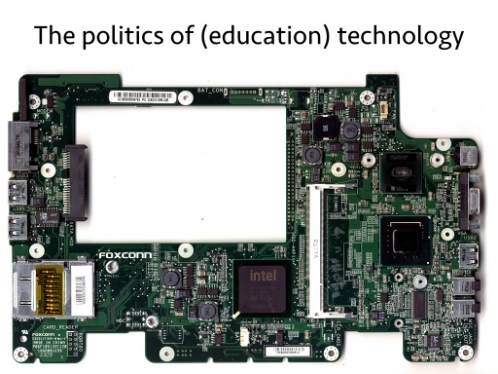Travel
Nope. Upcoming week: Hermosa Beach
Hack Education Writing
- Hack Education Weekly News
- Hack Education Weekly Newsletter
- Ed-Tech Imperialism and the XPRIZE for Global Learning
Editing Educating Modern Learners
- Questions over Answers, by Will Richardson
- Transforming School Culture, by Will Richardson and Brett Jacobsen
- Design Thinking for Innovation and Learning, by Ewan McIntosh
- EML Newsletter (Tuesday, Friday)
- What You Should Know This Week: Student Protests
Other Projects
It was the end of the month, so in addition to invoicing, I updated all my sites and CV with the talks and articles from the last month. And speaking of talks, I started planning for a few more upcoming ones: Leeds, NYU, LSE. I also did some planning for a guest appearance in a Stanford class on open knowledge.
I’m pulling together all my talks from 2014 into a book called Ed-Tech’s Monsters. I wrote the introduction and did some research this week about the best options for self-publishing it.
I launched my Patreon site – a new experiment in crowdfunding my work. (I’ve also been experimenting with Beacon Reader, but I’m less excited about it particularly as it seems to be used for funding writers to work for publications that already have funding.)
I was supposed to participate in a Connected Educators webinar this week, but had Internet issues. Here’s what I’d planned to say:

We talk a lot about the exciting opportunities that technology can afford us. Many of us have been talking about this for a long, long time. 2014 marks the 25th anniversary of one of the first one-to-one laptop programs, and the arguments for putting a computing device in the hands of each student pre-date that. Seymour Papert’s book Mindstorms was published in 1980, Alan Kay’s manifesto for “A Personal Computer for Children of All Ages” was published in 1972. Both of these talk about a learner centered use of technology, and I think it’s a powerful framework upon which many of us have built our work.
But I think we’ve reached the point where we have to talk about the challenges that computers now put before us. Because although we are surrounded by computing devices, although we can now and do now put computers into the hands of learners, we are still incredibly far from Papert’s vision. Indeed, we can see now the rapid adoption of computers as fulfilling other, far less savory goals of education and of politics.
I live in Los Angeles where the school district has earmarked a billion dollars to give each student an iPad. But it’s been very clear that in doing so, the interest isn’t in students’ curiosity or inquiry. It’s a content distribution mechanism for Pearson curriculum. And it’s a device that will be used for standardized testing.
Emails obtained by a local radio station suggest that this deal was first hatched between Pearson and the district superintendent, then Apple was brought on board. All this before the project ever went out for a public bid.
The politics of education technology.
We must address it. We must address it when the people who have the ear of government officials are from industry — whether from the textbook or testing or tech sectors, three sectors that are working more closely together.
And we must talk about the implications of technology, particularly under a regime that is not student centered. How might computers simply be making traditional education practices more efficient? How might computers be tools for surveillance? How might education technology be about extracting value — via data or content — from students rather than offering students the chance to create value and to have more say in what they learn and make?
I want us to ask better questions about ed-tech. And I think that those of us who have been pushing for more technology should also be the loudest about pushing back on the tech industry about some of the troubling aspects that they’re injecting into education.
Non-work-related projects: Kin and I went to the neighborhood wine store for a wine tasting. And having joined a gym last week, I went and worked out every day this week. RAWR!
Reading and Listening
I read Nicholas Carr’s The Glass Cage. I finished Bruce Sterling’s The Epic Struggle of the Internet of Things. I read Ivan Illich’s Tools for Conviviality. I started reading Hannah Arendt’s The Human Condition and Gillian Flynn’s Gone Girl.
I bought both of Prince’s new albums, Art Official Age and PlectrumElectrum.